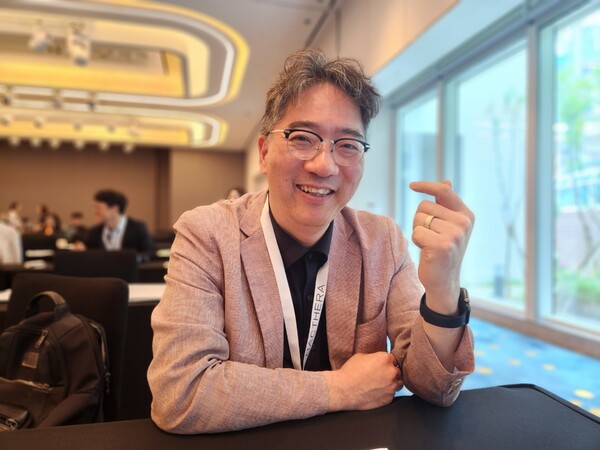“We want to develop a fecal microbial transplantation (FMT)-based treatment in the form of an oral capsule with a defined set of purely cultivated microbes to address the downfalls of FMT,” said the winner of the proof-of-concept study at a microbiome conference.

Korea Biomedical Review (KBR) spoke with Yoon Sang-sun, CEO of BioMe and a professor of microbiology and immunology, at the recently concluded Microbiome Connect Asia conference.
Yoon has been studying microbes with therapeutic potential and subsequently established a start-up company called BioMe.
The company aims to develop live biotherapeutic products (LBPs) against diverse human diseases including antibiotic-resistant infections, cardiovascular disease (CVD), inflammatory bowel disease, airway viral infections, and functional food for gut health.
BioMe working on FMT capsule BM111
Yoon introduced his most recent microbiome candidate, BM111, which he is co-developing with Celltrion.
A Celltrion spokesperson confirmed that the company was conducting an open collaboration project with BioMe for BM111.
BioMe's BM111 pitch also won the award for Bacthera’s proof of concept competition at Microbiome Connect Asia.
He explained the concept of the drug saying FMT has been well studied, especially for treating enteric infections like Clostridium difficile infection (CDI)."
However, he drew attention to the high incidence of antibody-resistant infections in Korea and other parts of the world. Accordingly, he stated that his team is investigating the carbapenemase-producing enterobacteriaceae (CPE) and vancomycin-resistant enterococci (VRE) which are two enteric pathogens that display high resistance to antibiotics.
FMT has been successfully employed to treat resistant infections but it also has some limitations, he stated. For example, it is usually difficult to find donors due to the screening requirements. It also requires scrutiny of the fecal transplant to control contaminants and it should be conducted in a hospital environment, thus limiting access to treatment.
Thus, FMT-based treatment needs to be transferred into an oral capsule so that patients worldwide can be treated more effectively, he said.
The disease burden of enteric infections like urinary tract, bloodstream, or intra-abdominal infections accounts for a significant portion of social and economic costs globally, Yoon estimated.
“By analyzing FMT clinical trial data, we compared the patients who responded against those who did not and identified four microbial species," he said. “Subsequently, we used an animal infection model to prove that these four species can do the intended job.”
Partnering with Celltrion, one of Korea’s pharma giants
Through open collaboration, BioMe is working with Celltrion to develop this new drug candidate.
Professor Yoon shared that Celltrion expressed interest in this microbiome therapeutic pipeline as they are very invested in developing LBP therapeutics.
Celltrion has already initiated an open collaboration agreement with LisCure earlier this year to develop a microbiome therapeutic for Parkinson’s disease.
“We are starting with government funding and then after reaching a certain level of development, Celltrion will decide when is the right time for licensing in and commercialization,” Yoon revealed. “Our goal is to initiate the proof-of-concept clinical trials next year and we are thinking about doing some investigator-initiated clinical trials at Severance Hospital.”
However, they face competition from Australian counterparts, BiomeBank, the first to meet a pharmaceutical standard for FMT therapies, which is also aiming to develop a lyophilized encapsulated FMT to replace FMT procedures.
He also referenced another company called Vedanta Bioscience which is also developing a drug candidate for FMT. However, he pointed out that they are using a consortia of approximately 20 different species but BioMe’s asset is superior as it contains only four species for greater production efficiency.
“I think we have a competitive drug compared to their pipeline because it's not going to be easy to individually cultivate 20 species,” he reasoned.
Targeting a non-intestinal disease like CVD through the intestine
Meanwhile, BioMe is also developing other treatments and one of them includes BM109 which targets the trimethylamine N-oxide (TMAO) molecule.
Patients with higher concentrations of the TMAO molecule in their blood, suffer more from many CVDs such as stroke, myocardial infection, and heart failure.
Yoon elaborated that TMAO production is indirectly influenced by some specific compounds such as choline, betaine, and L-carnitine based on the food we consume. He went on to explain that while younger individuals can filter and secrete the TMAO molecule through urine, older individuals with lower kidney function tend to accumulate this molecule in the blood causing complications such as atherosclerosis.
In this regard, BioMe has isolated a microbe species with a strong capability of degrading the TMAO molecule so it can be delivered orally into the intestine to break down TMAO and reduce its blood concentration to prevent CVD.
“Just as low-density lipoprotein (LDL) cholesterol is treated with statins, I hope that in the future, high TMAO blood concentration will be treated with BM109,” expressed Yoon optimistically.
Related articles
- 'Leveraging multiomics to solve microbiome issues for Korean LBP firms'
- Korean companies set high expectations for microbiome industry
- FMT offers cures for antibiotic-resistant therapies, but industry looks other way
- ‘Mixed culture microbiome therapeutics is holy grail but repeatability remains an issue’
- Microbiome Asia to showcase Korea's rapidly growing microbiome industry
- Celltrion’s Humira biosimilar bags FDA approval to treat autoimmune diseases
- Smaller microplastics enhance cardiotoxicity of carcinogens: study
- Celltrion applies for EMA marketing authorization for Stelara biosimilar
- KoBioLabs receives state funds to develop microbiome-based autism treatment
- HLB Science jumps into microbiome biz with NodCure
- Celltrion teams up with Rani Therapeutics again to develop oral Humira biosimilar
- Celltrion's Remsima SC scores marketing authorization in New Zealand

